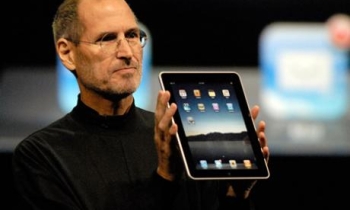February 18, 2007 -- A war between old and new media has begun.
After peaceably co-existing for years, the analog and digital media worlds have swapped the first salvos over content in what could be a very messy - and costly - battle.
Earlier this month, Apple CEO Steve Jobs squeezed off a shot over the bow of the music industry by posting a 1,800-word missive seeking to abolish copyright protection on digital music files.
Why should he care about guarding intellectual property? While Apple rings up millions of dollars in profits by selling music on its iTunes site, the music industry stands to lose between $90 billion and $160 billion in revenue during its transition to digital distribution, according to a recent report from IBM.
It's jabs like Jobs' that have got old media feeling bullied, and now they are fighting back.
Viacom earlier this month ordered YouTube to remove 100,000 pirated clips of shows such as "The Daily Show with Jon Stewart" and "The Colbert Report" from its site. According to sources, Viacom felt that YouTube was dickering around regarding deal points, specifically how policing of illegally posted material would be handled, during negotiations.
Of the decision to stand up to YouTube, no less than Viacom Chairman Sumner Redstone said, "If you want to use us, pay us."
In one of his first acts as president and CEO of NBC, Jeff Zucker followed Viacom's lead by accusing YouTube of being slow to implement filtering software that would weed out copyrighted material.
That was followed by news that entertainment's six families - News Corp., Viacom, Sony, NBC, Time Warner and Disney - complained to Google that it was supporting two Web sites suspected of trafficking in pirated films by directing users to those sites.
"[Old media] is being a bit more aggressive in asserting their rights," said Forrester Research entertainment analyst Josh Bernoff.
And well they should, given the potential revenue at stake.
Disney said last week that it sold 1.5 million movies on iTunes since September and expects to earn $25 million from the service this year.
Small potatoes, to be sure, but considering the growth potential, staking out a position now can mean the difference between making or losing millions of dollars in the future. New media revenue hit $55 billion last year and is expected to grow five times faster than traditional media over the next few years, according to the IBM report.
So far, it appears as if old media's hostile posture has only served to dampen buzz, not traffic. The YouTube community reacted swiftly after Viacom pulled its content, with users posting video pleas to boycott the company. According to Internet tracker Hitwise, YouTube's audience actually grew by 7 percent the week after Viacom demanded the site remove its pirated content.
Bernoff believes a pitched battle - and some bloodshed - is inevitable. "You have to have the threat of not participating or walking away in a negotiation," he said.
"This back-and-forth will be a continual process."









